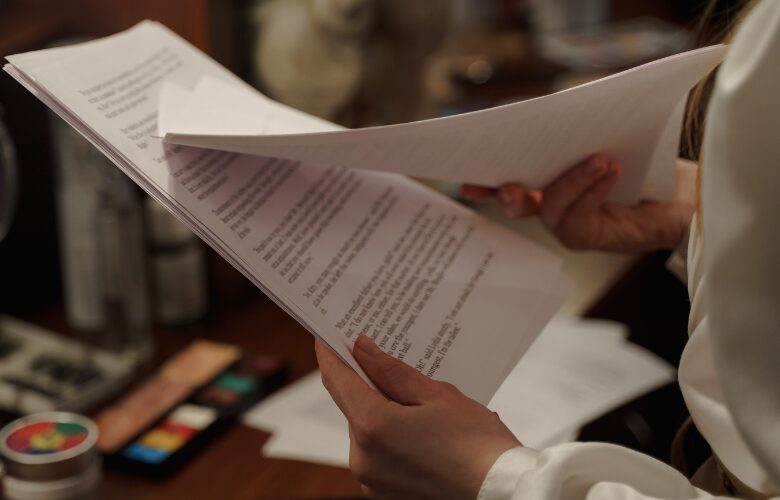
Some common thespian terms that almost everyone in the theatrical and live events industry knows are great to have in your vocabulary if you want to get a foot in the door. Some of these term are more technically inclined while others are used more commonly by performers. Either way, these terms are heard throughout any stage of careers by those in the live events industry.
It is exactly as the term suggests: It’s a small theatre with four black walls, a flat floor, and typically no raked seating. Black Box theatres are where many community actors get their start. Black Boxes are also common in universities and small towns so as to keep maintenance and set costs to a minimum.
This is to diminish lighting and/or sound levels. When someone asks for the lights to ‘fade’ or the sound to ‘fade’ this is what they are talking about. It’s most commonly asked by the technical manager, director, or stage manager. But you won’t hear a sound technician telling a lighting technician to fade the house lights as that’s not another technician’s job. We wait to hear ‘go’ not tell each other how to do our jobs.
This is an electrical light left on stage turned on when the theatre would otherwise be unoccupied or completely dark. The ghost light is left out before the technician’s call out the last ‘going dark’ for the evening and prepare to leave the building. Ghost lights originally came around during the days of gas-lit theatres when companies left the gas burning to alleviate pressure and keep theatre ghosts happy, but today they are used mainly to keep superstition at bay and for safety purposes. Even during the pandemic, many claimed ‘every stage on Broadway had a lamp’.
This is the holy microphone. This is the microphone kept near the person in charge so they can be heard everywhere. Sometimes this means keeping the God Mic near the sound engineer when doing sound check so they don’t have to run to the stage for the performers to hear them while they’re trying to get levels. Other times this means keeping the God Mic near the Director when it’s hell week because they’re stressed and they need everyone to know it.
Every actor needs to know when to be off book by. Being off book means the actors need to have their lines memorised unless they want to face the fury of the Director. Being off book typically needs to be while still in rehearsals and before tech week. Some larger productions give their actors the script in advance and expect them to be off book before rehearsals even begin.
Similar to raked seating in the sense that one area is raised at the back (or upstage). Raked stages are most common in the U.K. and Europe, the most notable one being The Globe Theatre or Shakespeare’s Globe. This is also where the terms upstage and downstage came from as the performer was literally moving up and down the raked stage.
This is the gauze that is used similarly to a curtain in certain productions. You can see hazily what is going on behind the scrim, but it separates the actors from the audience. The scrim will most often rise at the beginning of Act 1 and drop during the interval only to rise again when the interval is finished.
The distance of lighting hitting an object is a throw. You’ll commonly hear lighting technicians groan about lamps being slightly knocked out of place and are now throwing light onto a different area they intended. Video technicians will also use this term when they’re talking about projections being on stage.
If you hear someone calling out “Can I get workers on stage?” They are not asking for crew, they are asking for lights. Workers are lights that only light up the wings and stage for working purposes such as cleaning the stage, pulling out heavy duty equipment, and making sure no one trips backstage during rehearsals. These lights are different from the show lights as the workers are for the venue, not the show itself.


Janine has always been a part of music and performing. The first show that inspired her to go into theatre was the Velveteen Rabbit which she saw as a child, and Drew works to keep that magic alive in her work. When Drew was accepted into an internship program for audio engineering at a recording studio, she jumped at the opportunity. That was at the start of 2020, and so much has happened since then, both in her career and in the world. Since then, Drew has taken several opportunities to work at recording studios, concerts, festivals, and even large theatres while spending some time on tour. Drew's favorite by far though, has been the chance to work on Broadways and West End shows, as this was a dream come true. Drew is honoured to get to share these experiences from being inside the entertainment industry.
Read Full Profile© 2021 TheatreArtLife. All rights reserved.

Thank you so much for reading, but you have now reached your free article limit for this month.
Our contributors are currently writing more articles for you to enjoy.
To keep reading, all you have to do is become a subscriber and then you can read unlimited articles anytime.
Your investment will help us continue to ignite connections across the globe in live entertainment and build this community for industry professionals.